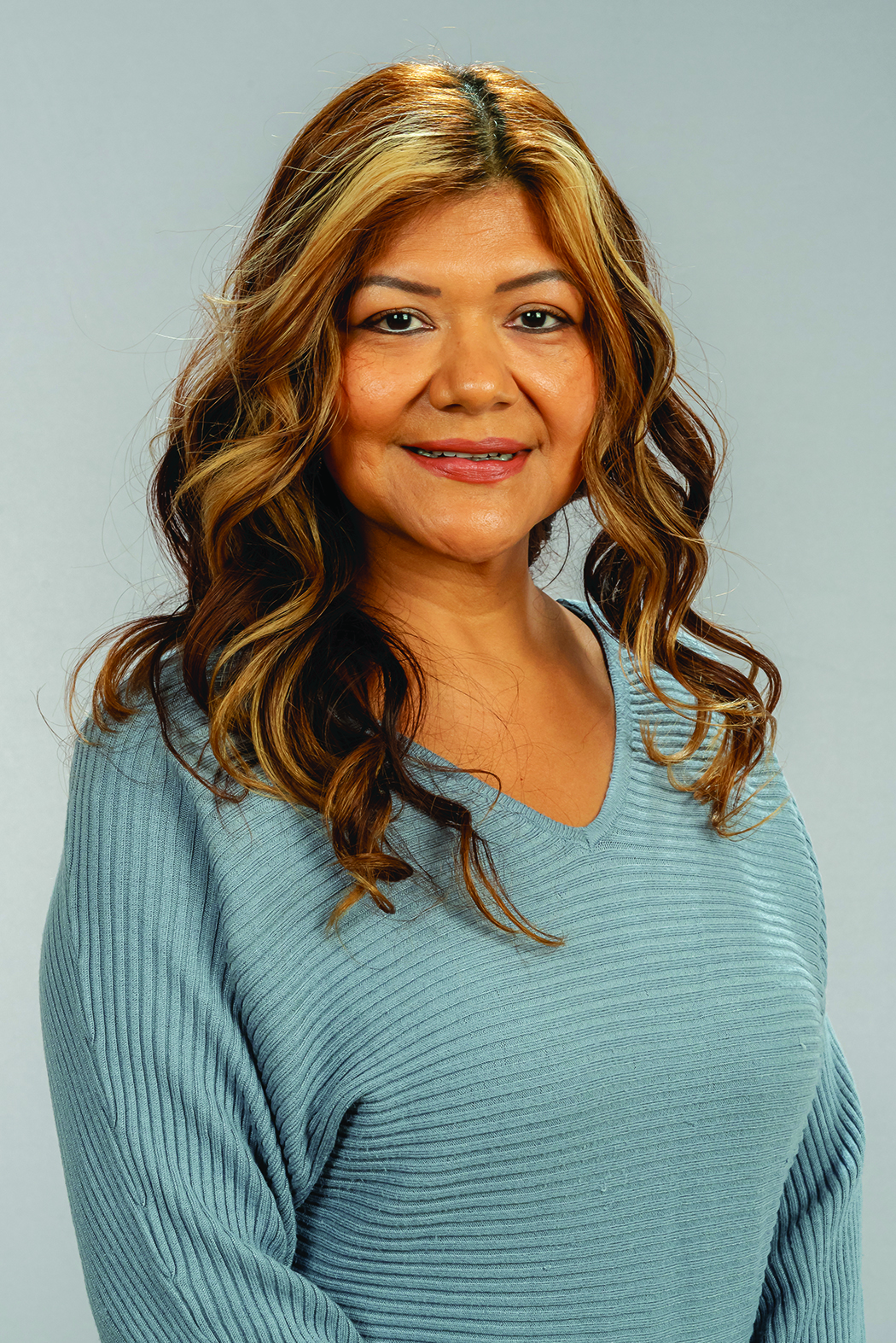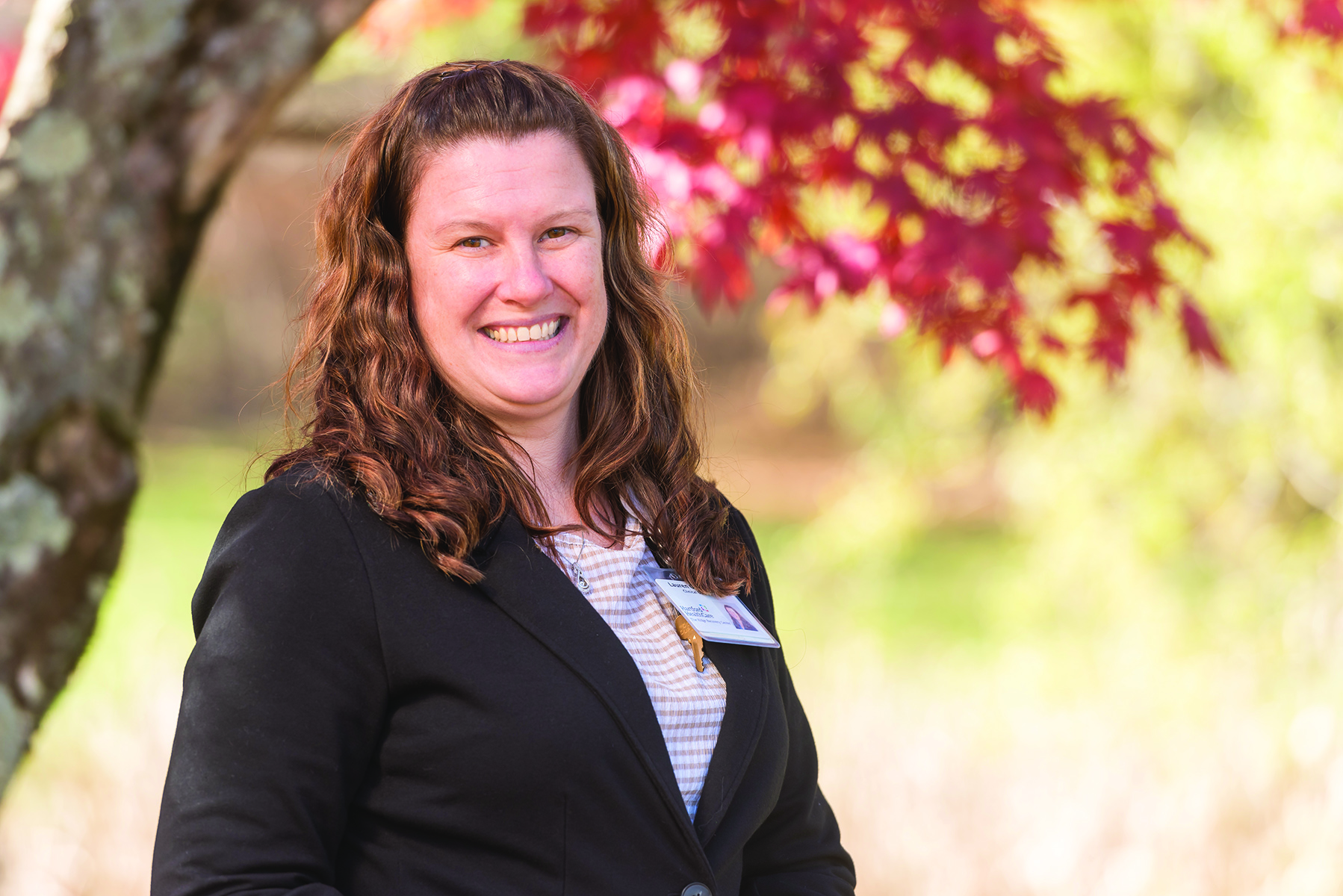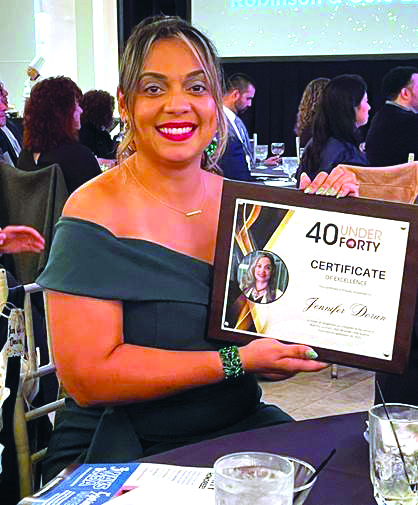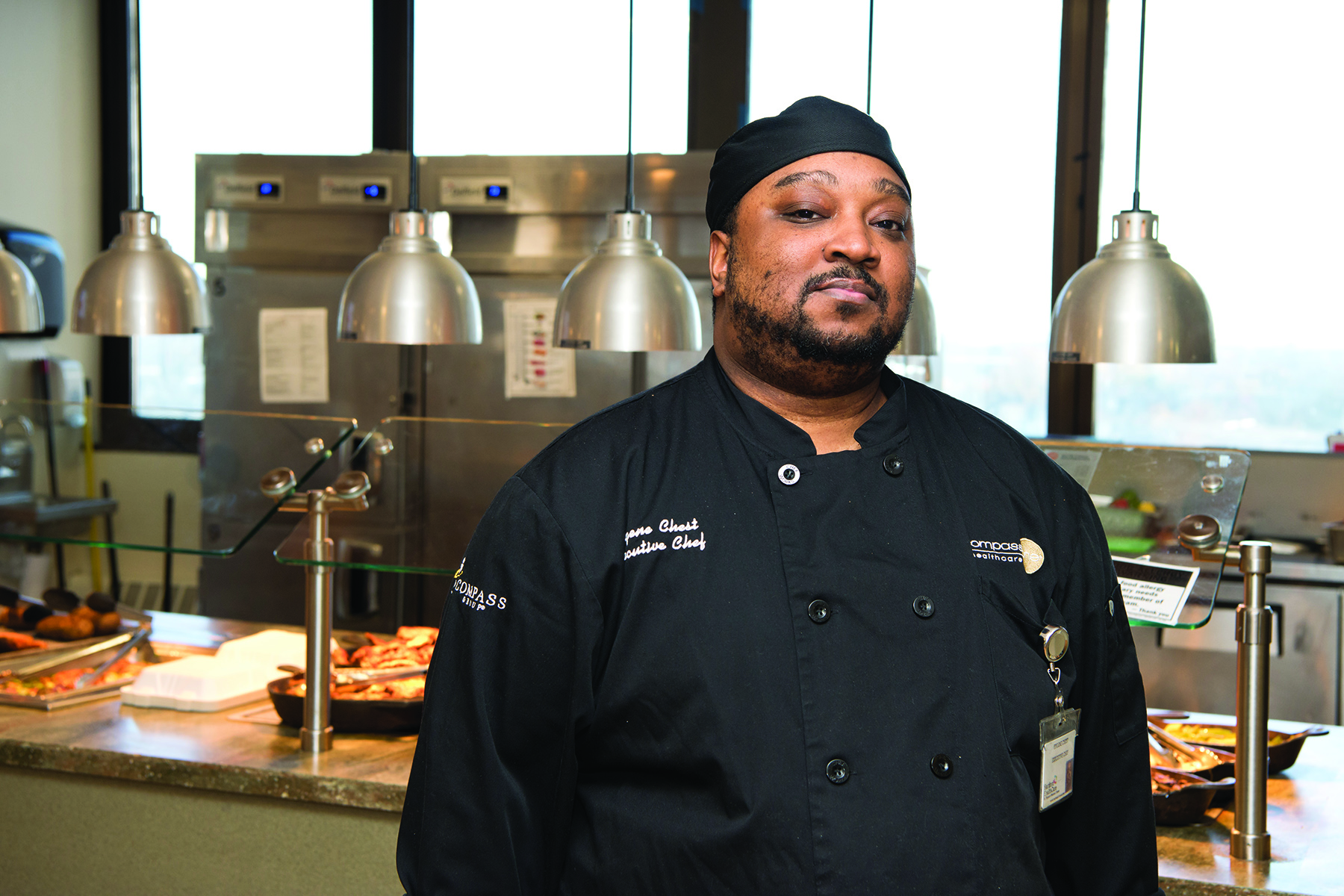The Power of Committing to Collaboration
By Maggie Werner
Nora Brugueras, born in Colombia, moved to the United States at the age of 7, starting a new life in Hartford with her mother and four siblings. From that moment on, she had a passion for helping others.
But her previous career left her feeling unfulfilled. She knew it was time to make a change. She decided to pursue her passion for human services.
This part of Brugueras’ journey began in 2008 with an internship at Hartford HealthCare and led her to work as a health system navigator in the Early Detection and Prevention Program. In this role, she devoted more than 13 years to increasing the number of women getting breast and cervical cancer screening, plus diagnostic and treatment referrals.
Yet, her goals expanded beyond screening. Through collaboration and her innate ability to bring diverse stakeholders together, Brugueras created the HHC Women’s Wellness Day, an annual event offering vital breast and cervical services directly to the community.
Launched in October 2018, Women’s Wellness Day reflects her commitment to reaching women facing barriers to care. The program’s impact breaks down such barriers as fear, lack of insurance and trouble navigating the healthcare system.

Drawing on her immigrant experience, she aims to ensure every woman, regardless of status, has access to essential screenings. Her concern extends beyond medical services, addressing holistic health and empowering women with knowledge.
Over the years, women continue to express gratitude for the program’s accessibility, especially on Saturdays when it caters to a population often overlooked by traditional healthcare. Empathy and cultural competence help Brugueras navigate the complexities faced by the underserved.
She also draws on her journey as a cancer survivor herself, and as a caregiver for her husband as he battles cancer. Strength from such personal experiences amplifies her advocacy and support for others facing health challenges.
Transitioning into a statewide role, Brugueras teaches and supports new hires, emphasizing the importance of collaboration building relationships to create sustainable and impactful programs. Her message, like her visionary leadership, is rooted in her experience, showcasing the profound impact one person can have when fueled by passion, empathy, and a commitment to collaborative change.
Ridge Director Knows Path to Recovery Well
By Elissa Bass
Treatment for substance use disorder and addiction has greatly evolved over the last few decades to care that is personalized, and aimed at physical, emotional and psychological health and healing.
At The Ridge Recovery Center, there is a literal path to recovery meandering through trees on the idyllic 60-acre property in Windham. Perhaps no one understands the journey of finding — and staying on — that path more than Ridge clinical director Lauren Galarneau.
In 2006, Galarneau came to Connecticut from Maryland in search of help for her own addiction. She was in her 20s and still on her parents’ insurance, unable to find care in her home state. Her experience with that search, recovery and years of sobriety helped shape her career, and made her a perfect fit for The Ridge.
“One of the goals of The Ridge is to break down barriers and increase access to care, and to create availability to those who may not always have many options for treatment,” she says.
Treatment today, she adds, is so different from methods used in the past.
“It was very rigid — do this, do that. There was only one way to do things,” Galarneau explains. “What we know now is there are many different paths of recovery, and they all need to be incorporated. We need to do that to give clients the best possible chance to obtain their recovery.
“We incorporate holistic, trauma-informed approaches with evidence-based interventions including, but not limited to, cognitive behavioral therapy, dialectical behavioral therapy and motivational interviewing,”

Features like art and pet therapy, walking trails, yoga, movement classes, a fully equipped gym, auricular acupuncture, sound therapy and more have already set The Ridge apart from other treatment facilities.
“Study after study has shown that the cookiecutter approach to recovery doesn’t work. There are all different types of support and different pathways that lead to greater outcomes of success,” she says.
Prior to starting at The Ridge, Galarneau was a clinical program manager at Rushford, where she had held a variety of positions in management and direct patient care over her nine years. She has an associate’s degree in drug and alcohol recovery counseling, plus bachelor’s and master’s degrees in social work. She is a licensed clinical social worker and licensed alcohol and drug counselor. She is also certified in auricular acupuncture, which focuses on the ears and is a well-known therapy for substance use disorders.
When talking about The Ridge, Galarneau is particularly excited about the “extended stay” accommodations. After treatment is “officially” complete, patients can opt for extended stay housing, where they’ll have access to outpatient and partial hospital services as well as all other amenities.
“This will be a safe, sober living environment,” she explains. “We wanted to incorporate a smoother transition back to their life. Often, when someone finishes residential care and they are ‘done,’ they don’t feel quite ready. With this, they have a safe environment and familiar supports while waiting to fully transition back to their community.”
The Ridge offers:
- A three-tier, comprehensive design for recovery care, from medically monitored withdrawal management (16 beds) through residential treatment (36 beds) and beautifully appointed, sober living accommodations for the option of extending one’s stay
- En suite, single rooms which ensure time and space for individual privacy and respite.
- Individual counseling
- Group therapy
- Medication management
- Trauma-informed care
- Support and educational groups, including art and pet therapy, financial counseling
- Recreation and fitness options, including Planet Fitness gym, walking trails, yoga, morning movement classes and more, as well as spiritual support
- Premier dining, including vegetarian and gluten-free options.
- Family support, including groups
Blazing a Trail to Success for Herself and Others
By Hilary Waldman

When teenager Jennifer Rivera sought college advice in her high school guidance office in East Hartford 20 years ago, the secretary asked the young Latina if she was there for the teen moms class.
The teenager, now Jennifer Doran, reacted in what has become her successful signature style: She didn’t get angry. She didn’t internalize the belittling assumption. She simply plowed forward with a polite persistence that carried her from poverty to Hartford HealthCare’s professional fast track.
“You have to take control of your journey,” says Doran, 38, reflecting on a year in which she was recognized as one of Connecticut’s 40 under 40 by the Hartford Business Journal and with the Emerging Leader Award from the Hispanic Health Council, where she serves on the board of directors. Most recently, Fortune’s Business Review named her to its list of the 10 most empowering women leaders in business 2023.
HHC EVP and Chief Operating Officer Mike Daglio recalls advising Doran and Jose Garcia when they led the SOMOS Colleague Resource Group (CRG). Daglio is executive sponsor. To climb the leadership ladder, he suggested they join a community board of directors.
“They didn’t just join, they kicked the door down,” he says.
From that day in the guidance office, every step of Doran’s journey has been deliberate. After earning her bachelor’s degree, she completed a dual master’s program, graduating from the University of Phoenix with degrees in business (MBA) and health administration (MHA).
She joined HHC in 2007 as a program assistant in the bariatrics program and, after numerous promotions over 16 years, is now senior director of the HHC Digestive Health Institute.
Ambitious and determined, she has sought opportunities for growth and mentorship, honing her warm, candid, no-nonsense style that early in her career, earned her some less than flattering feedback.
“I felt like I was having to prove myself, I was wearing a mask,’’ she says, recalling observations that she could be “too loud,” “too out there,” “not polished enough.”
She’s smoothed the rough edges a bit, but Doran says she’s grateful to now be recognized and respected for being herself in an organization with equity at its core.
“When you have leaders who walk the walk and talk the talk, that’s what’s keeping me [at HHC],” she says.
The daughter of a teenage mother who poured all her energy into creating opportunity for her children, Doran learned by example. After raising five children — including one with a doctorate — her mother earned her bachelor’s degree in 2014.
Doran married her high school sweetheart, Brendan Doran, and together they are singularly focused on their children’s future. They own a home in South Windsor plus investment property. Olivia, 15, is enrolled in a competitive high school. Carter is a fourth grader who invests in stocks with his father and aspires to be a paleontologist.
“We are making generational change,” Doran says.
Whipping Up Success in the SVMC Kitchen
By Robin Stanley

What began as a part-time job turned into a fulfilling career for St. Vincent’s Medical Center executive chef Eugene Chest.
In 2008, Chest started a per diem position as a pot washer in the St. Vincent’s cafeteria to help offset the cost of local college certifications. His background is in computers, having graduated from Temple University as a computer science major, and working briefly as a network technician. When he realized it wasn’t quite what he wanted to do, he turned to his other passion, cooking.
“I’ve always enjoyed cooking for my family and I was good at it.”
“It was not the daily thing that I wanted to do, so I decided to look around and see what else there was,” he says. “I’ve always enjoyed cooking for my family and I was good at it.”
At St. Vincent’s, Chest began working his way up to cook and sous chef. Last fall, he made his way to the top, named executive chef. He oversees dayto-day responsibilities like finances, equipment use, food ordering and menu creation for both St. Vincent’s and Westport Behavioral Health.
“It cemented my goals,” he says. “I had a goal in my mind and knew I was on the right path to get there.”
Recently, he helped coordinate food for the system-wide Medical Mission, which he’d been involved with at St. Vincent’s for several years.
When wearing the chef’s hat, his specialties include outdoor grilling and Asian foods. He recently returned from a trip to Japan where he learned more about the culture and food.
“I wanted to see how the food tasted in Japan versus here. I feel like you can’t cook if you don’t know the origins of what you are cooking,” Chest says. “I wanted to try everything and then replicate it.”
He also makes it a point to mentor other cooks as a way to pay it forward.
“I tell people if they want to learn, I’ll teach them,” he says. “I’ve had two people work for me and one is a sous chef aspiring to be an executive chef.”
